- Home
- Jean M. Auel
The Earth's Children Series 6-Book Bundle Page 5
The Earth's Children Series 6-Book Bundle Read online
Page 5
She can’t be very old, Iza thought, she didn’t even know how to find food. I wonder how long she’s been alone? What could have happened to her people? Could it have been the earthquake? Has she been wandering by herself that long? And how did she escape from a cave lion with only a few scratches? Iza had treated enough maulings to know the girl’s wounds were inflicted by the huge cat. Powerful spirits must protect her, Iza decided.
It was still dark, though dawn was approaching, when the child’s fever finally broke in a drenching sweat. Iza cuddled her close, adding her warmth and making sure she was well covered. The girl woke shortly afterward and wondered where she was, but it was too dark to see. She felt the reassurance of the woman’s body next to her and closed her eyes again, drifting into a more restful sleep.
As the sky lightened, silhouetting the trees against its faint glow, Iza crept quietly out of the warm fur. She stoked the fire, added more wood, then went to the small creek to fill her bowl and peel bark off a willow tree. She paused for a moment, clutched her amulet, and thanked the spirits for willow. She always thanked the spirits for willow, for its ubiquitous presence as well as for its painkilling bark. She couldn’t remember how many times she had peeled willow bark for a tea to relieve aches and pains. She knew of stronger painkillers, but they also dulled the senses. The analgesic properties of willow just dulled the pain and reduced fever.
A few other people were beginning to stir as Iza sat hunched over the fire adding small hot stones to the bowl of water and willow bark. When it was ready, she carried it back to the fur, carefully rested the bowl in a small depression scooped out of the ground, then slid in beside the child. Iza watched the sleeping girl, noting that her breathing was normal, intrigued by her unusual face. The sunburn had faded to tan except for a little peeling skin across the bridge of her small nose.
Iza had seen her kind once, but only from a distance. Women of the Clan always ran and hid from them. Unpleasant incidents had been told at Clan Gatherings of chance encounters between the Clan and the Others, and Clan people avoided them. Women, especially, were allowed little contact. But the experience of their clan had not been bad. Iza remembered talking with Creb about the man who had stumbled into their cave long before, nearly out of his head with pain, his arm badly broken.
He had learned a little of their language, but his ways were strange. He liked to talk to women as well as men and treated the medicine woman with great respect, almost reverence. It hadn’t kept him from gaining the respect of the men. Iza wondered about the Others, lying awake watching the child as the sky grew lighter.
While Iza was looking at her, a shaft of sunlight fell on the child’s face from the bright ball of flame just edging over the horizon. The girl’s eyelids fluttered. She opened her eyes and looked into a pair of large brown eyes, deep set below heavy brow ridges in a face that protruded somewhat, like a muzzle.
The girl screamed and squeezed her eyes shut again. Iza drew the child close to her, feeling her scrawny body shaking with fear, and murmured soothing sounds. The sounds were somehow familiar to the child, but more familiar was the warm comforting body. Slowly, her shaking stilled. She opened her eyes a tiny crack and looked at Iza again. This time she didn’t scream. Then she opened her eyes wide and stared at the frightening, totally unfamiliar face of the woman.
Iza stared too, in wonder. She had never seen eyes the color of the sky before. For a moment she wondered if the child was blind. Eyes of older Clan people sometimes grew a film over them, and as the film clouded the eyes to a lighter shade, sight grew dimmer. But the pupils of the child’s eyes dilated normally and there could be no doubt she had seen Iza. That light blue-gray color must be normal for her, Iza thought.
The little girl lay perfectly still, afraid to move a muscle, her eyes wide open. When the child sat up with Iza’s help, she winced in pain from the movement, and her memories came flooding back. She recalled the monstrous lion with a shudder, visualizing the sharp claw raking her leg. She remembered struggling to the stream, thirst overcoming her fear and the pain in her leg, but she remembered nothing before. Her mind had blocked out all memory of her ordeal wandering alone, hungry and afraid, the terrifying earthquake, and the loved ones she had lost.
Iza held the cup of liquid to the child’s mouth. She was thirsty and took a drink, and made a face at the bitter taste. But when the woman put the cup back to her lips, she swallowed again, too frightened to resist. Iza nodded approval, then left to help the women prepare the morning meal. The little girl’s eyes followed Iza, and she opened them wider when she saw for the first time a camp full of people who looked like the woman.
The smell of cooking food brought pangs of hunger, and when the woman returned with a small bowl of meaty broth thickened with grain into a gruel, the child gulped it down ravenously. The medicine woman didn’t think she was ready for solid food yet. It didn’t take much to fill her shrunken stomach, and Iza put the remainder in a water skin for the child to drink while they traveled. When the girl was through, Iza laid her down and removed the poultice. The wounds were draining and the swelling was down.
“Good,” Iza said aloud.
The child jumped at the harsh guttural sound of the word, the first she had heard the woman speak. It didn’t sound like a word at all, more like a growl or grunt of some animal to the girl’s untutored ears. But Iza’s actions were not animallike, they were very human, very humane. The medicine woman had another mashed root ready and while she was applying the new dressing, a misshapen, lopsided man hobbled toward them.
He was the most fearsomely repulsive man the girl had ever seen. One side of his face was scarred and a flap of skin covered the place where one of his eyes should have been. But all of these people were so alien and ugly to her, his forbidding disfiguration was only a matter of degree. She didn’t know who they were or how she happened to be among them, but she knew the woman was taking care of her. She had been given food, the dressing cooled and soothed her leg, and most of all, from the depths of her unconscious mind, she felt a relief from the anxiety that had filled her with aching fear. Strange as these people were, with them she was, at least, no longer alone.
The crippled man eased himself down and observed the child. She returned his look with a frank curiosity that surprised him. The children of his clan were always a little afraid of him. They learned quickly that even their elders held him in awe, and his aloof manner didn’t encourage familiarity. The gulf widened when mothers threatened to call Mog-ur if they misbehaved. By the time children were nearly adults, most of them, especially girls, really feared him. It wasn’t until they gained the maturity of middle years that members of the clan came to temper their fear with respect. Creb’s good right eye sparkled with interest at this strange child’s fearless appraisal of him.
“The child is better, Iza,” he indicated. His voice was lower pitched than the woman’s, but the sounds he made were more like grunts than words to the girl. She didn’t notice the accompanying hand signals. The language was totally alien to her; she only knew the man had communicated something to the woman.
“She is still weak from hunger,” Iza said, “but the wound is better. The gashes were deep, but not enough to seriously damage her leg, and the infection is draining. She was clawed by a cave lion, Creb. Have you ever known a cave lion to stop with a few scratches once it decided to attack? I’m surprised she’s alive. She must have a strong spirit protecting her. But,” Iza added, “what do I know of spirits?”
It was certainly not a woman’s place, not even his sibling’s, to tell Mog-ur about spirits. She made a deprecating gesture that also begged his forgiveness for her presumption. He didn’t acknowledge her—she hadn’t expected him to—but he looked at the child with greater interest as a result of her comment about a strong protecting spirit. He had been thinking much the same thing himself, and though he would never admit it, his sibling’s opinion carried weight with him, and confirmed his own thoughts.
&nb
sp; They broke camp quickly. Iza, loaded with her basket and bundles, reached down to hoist the girl up to her hip and fell in behind Brun and Grod. Riding on the woman’s hip, the little girl looked around her with curiosity while they traveled, watching everything Iza and the other women did. She was particularly interested whenever they stopped to gather food. Iza often gave her a bite of a fresh bud or tender young shoot, and it brought a vague recollection of another woman who had done the same thing. But now, the girl paid closer attention to the plants and began to notice identifying characteristics. Her days of hunger aroused in the young child a keen desire to learn how to find food. She pointed to a plant and was pleased when the woman stopped and dug up its root. Iza was pleased, too. The child is quick, she thought. She couldn’t have known it before or she would have eaten it.
They stopped for a rest near midday while Brun looked over a possible cave site, and after giving the youngster the last of the broth from the water skin, Iza handed her a strip of hard dry meat to chew. The cave was not adequate for their needs. Later in the afternoon, the girl’s leg began to throb as the effects of the willow bark wore off. She squirmed restlessly. Iza patted her and shifted her weight to a more comfortable position. The girl gave herself over completely to the woman’s care. With total trust and confidence, she wrapped skinny arms around Iza’s neck and rested her head on the woman’s broad shoulder. The medicine woman, childless for so long, felt a surge of inner warmth for the orphaned girl. She was still weak and tired, and lulled by the rhythmic motion as the woman walked, she fell asleep.
By the time evening approached, Iza was feeling the strain of the additional burden she carried and was grateful to let the child down when Brun called a halt for the day. The girl was feverish, her cheeks flushed and hot, her eyes glazed, and while the woman looked for wood, she also looked for plants to treat the child again. Iza didn’t know what caused infection, but she did know how to treat it, and many other ailments as well.
Though healing was magic and couched in terms of spirits, it didn’t make Iza’s medicine less effective. The ancient Clan had always lived by hunting and gathering, and generations of using wild plantlife had, by experiment or accident, built up a store of information about it. Animals were skinned and butchered and their organs observed and compared. The women dissected while preparing dinner and applied the knowledge to themselves.
Her mother had shown Iza the various internal parts and explained their functions as part of her training, but it was only to remind her of something she already knew. Iza was born to a highly respected line of medicine women and, through a means more mysterious than training, knowledge of healing was passed on to a medicine woman’s daughters. A fledgling medicine woman of an illustrious line had a higher rank than an experienced one of mediocre antecedents—with good reason.
Stored in her brain at birth was the knowledge acquired by her ancestors, the ancient line of medicine women of which Iza was a direct descendant. She could remember what they knew. It was not much different from recalling her own experience; and once stimulated, the process was automatic. She knew her own memories primarily because she could also remember the circumstances associated with them—she never forgot anything—and she could only recall the knowledge in her memory bank, not how it was learned. And although Iza and her siblings had the same parents, neither Creb nor Brun had her medical knowledge.
Memories in Clan people were sex differentiated. Women had no more need of hunting lore than men had of more than rudimentary knowledge of plants. The difference in the brains of men and women was imposed by nature, and only cemented by culture. It was another of nature’s attempts to limit the size of their brains in an effort to prolong the race. Any child with knowledge rightfully belonging to the opposite gender at birth lost it through lack of stimulation by the time adult status was reached.
But nature’s attempt to save the race from extinction carried with it the elements to defeat its own purpose. Not only were both sexes essential for procreation, but for day-to-day living; one could not survive for long without the other. And they could not learn each other’s skills, they hadn’t the memories for it.
But the eyes and brain of people of the Clan had also endowed both genders with acute and perceptive vision, though it was used in different ways. The terrain had been changing gradually as they traveled, and, unconsciously, Iza recorded each detail of the landscape they passed through, noting especially the vegetation. She could discern minor variations in the shape of a leaf or the height of a stalk from a great distance, and though there were some plants, a few flowers, an occasional tree or shrub she had never seen before, they were not unfamiliar. From a recess deep in the back of her large brain she found a memory of them, a memory not her own. But even with that tremendous reservoir of information at her disposal, she had recently seen some vegetation that was completely unfamiliar, as unfamiliar as the countryside. She would have liked to examine it more closely. All women were curious about unknown plantlife. Though it meant acquiring new knowledge, it was essential to immediate survival.
Part of every woman’s heredity was the knowledge of how to test unfamiliar vegetation, and like the rest, Iza experimented on herself. Similarities to known plants placed new ones in relative categories, but she knew the dangers of assuming similar characteristics meant identical properties. The procedure for testing was simple. She took a small bite. If the taste was unpleasant, she spit it out immediately. If it was agreeable, she held the tiny portion in her mouth, carefully noting any tingling or burning sensations or any changes in taste. If there were none, she swallowed it and waited to see if she could detect any effects. The following day, she took a larger bite and went through the same procedure. If no ill effects were noticed after a third trial, the new food was considered edible, in small portions at first.
But Iza was often more interested when there were noticeable effects, for that indicated a possibility of a medicinal use. The other women brought anything unusual to her when they applied the same test for edibility or anything that had characteristics similar to plants known to be poisonous or toxic. Proceeding with caution, she experimented with these too, using her own methods. But such experimentation took time, and she stayed with plants she knew while they traveled.
Near this campsite, Iza found several tall, wandlike, slim-stemmed hollyhocks with large bright flowers. The roots of the multicolored flowering plants could be made into a poultice similar to iris roots to promote healing and reduce swelling and inflammation. An infusion of the flowers would both numb the child’s pain and make her sleepy. She collected them along with her wood.
After the evening meal, the little girl sat propped up against a large rock watching the activities of the people around her. Food and a fresh dressing had refreshed her and she jabbered at Iza, though she could tell the woman didn’t understand her. Other clan members glanced disapprovingly in her direction, but the child was unaware of the meaning of the looks. Their underdeveloped vocal organs made precise articulation impossible for people of the Clan. The few sounds they used as emphasis had evolved from cries of warning or a need to gain attention, and the importance attached to verbalizations was a part of their traditions. Their primary means of communication—hand signals, gestures, positions; and an intuition born of intimate contact, established customs, and perceptive discernment of expressions and postures—were expressive, but limited. Specific objects seen by one were difficult to describe to others, and abstract concepts even more so. The child’s volubility perplexed the clan and made them distrustful.
They treasured children, reared them with gentle fond affection and discipline which grew more stern as they grew older. Babies were pampered by women and men alike, young children rebuked most often by simply being ignored. When children became aware of the higher status of older children and adults, they emulated their elders and resisted pampering as fit only for babies. Youngsters learned early to behave within the strict confines of established custom,
and one custom was that superfluous sounds were inappropriate. Because of her height, the girl seemed older than her years, and the clan considered her undisciplined, not well brought up.
Iza, who had been in much closer contact with her, guessed she was younger than she seemed. She was coming to a close approximation of the girl’s true age and she responded to her helplessness more leniently. She sensed, too, from her mutterings while she was delirious, that her kind verbalized more fluently and more frequently. Iza was drawn to the child whose life depended on her and who had wrapped scrawny little arms around her neck in complete trust. There will be time, Iza thought, to teach her better manners. She was already beginning to think of the child as hers.
Creb wandered over while Iza was pouring boiling water over the flowers of the hollyhocks, and sat down near the child. He was interested in the stranger, and since the preparations for the evening ceremony were not yet complete, he went to see how she was recovering. They stared at each other, the young girl and the crippled, scarred old man, studying each other with equal intensity. He had never been so close to one of her kind and had never seen a young one of the Others at all. She didn’t even know of the existence of Clan people until she woke up to find herself among them, but more than their racial characteristics, she was curious about the puckered skin of his face. In her limited experience, she had never seen a face so horribly scarred. Impetuously, with the uninhibited reactions of a child, she reached out to touch his face, to see if the scar felt different.

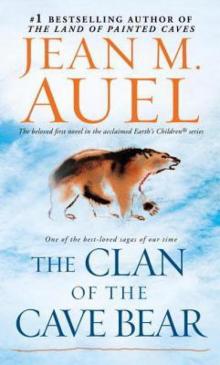 The Clan of the Cave Bear
The Clan of the Cave Bear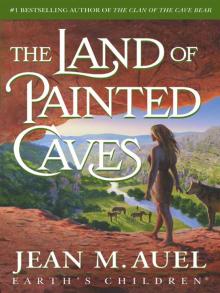 The Land of Painted Caves
The Land of Painted Caves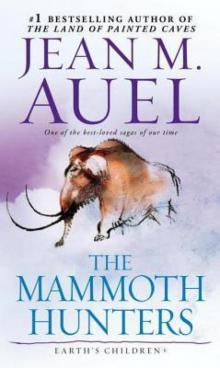 The Mammoth Hunters
The Mammoth Hunters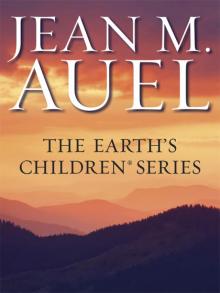 The Earth's Children Series 6-Book Bundle
The Earth's Children Series 6-Book Bundle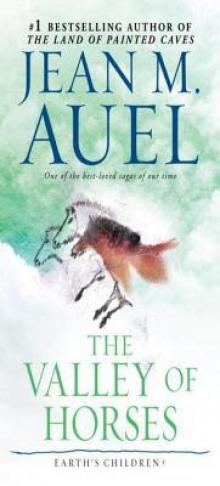 The Valley of Horses
The Valley of Horses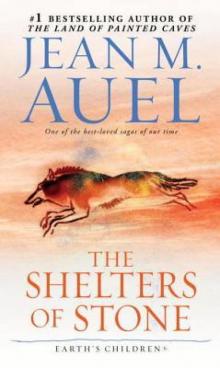 The Shelters of Stone
The Shelters of Stone The Clan of the Cave Bear ec-1
The Clan of the Cave Bear ec-1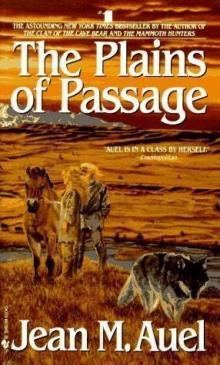 THE PLAINS OF PASSAGE ec-4
THE PLAINS OF PASSAGE ec-4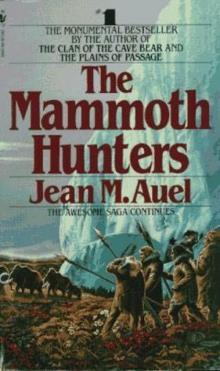 The Mammoth Hunters ec-3
The Mammoth Hunters ec-3 THE SHELTERS OF STONE ec-5
THE SHELTERS OF STONE ec-5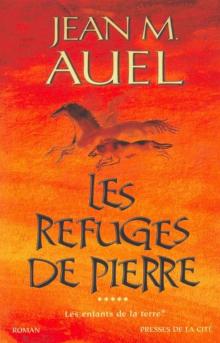 Les refuges de pierre
Les refuges de pierre![Earth's Children [02] The Valley of Horses Read online](http://i1.bookreadfree.com/i1/03/30/earths_children_02_the_valley_of_horses_preview.jpg) Earth's Children [02] The Valley of Horses
Earth's Children [02] The Valley of Horses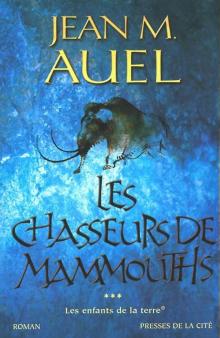 Les chasseurs de mammouths
Les chasseurs de mammouths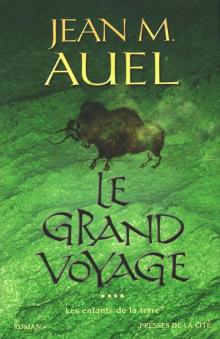 LE GRAND VOYAGE
LE GRAND VOYAGE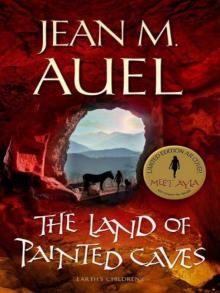 The Land of Painted Caves ec-6
The Land of Painted Caves ec-6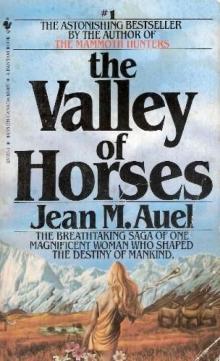 The Valley Of Horses ec-2
The Valley Of Horses ec-2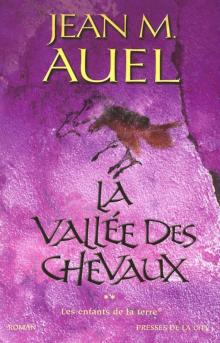 La Vallée des chevaux
La Vallée des chevaux